#if anyone wants me to share
Explore tagged Tumblr posts
Text
One of my recent posts got a few comments about media literacy being dead and Neil being an unreliable narrator so I want to clear some things up.
Firstly, media literacy isn't dead becuase it cannot die. Also, I am not a big fan of fear mongering. Humans have always sought to understand and communicate with each other about the things we create. It is a skill that can be taught and should be practiced. There is no one right way to do it. And, while I think the education system fails so many of us (something something to make us easier to control something something), I also think that there are tons of resources to help us learn without the need for an official "teacher". So, instead of pessimistically saying is it "dead" (especially on someone's textual analysis post, like... are you saying I prove it's dead becuase I don't have media literacy? are you agreeing with me and therefore proving yourself wrong? do I not count for some reason? i don't think I get it), engage in discourse about media that you love. And I mean actual discourse, not just fighting on social media about whether or not everyone should "like" your favorite character. Ask yourself "what is the effect of this rhetorical device in the text?" "is the text trying to make me like or not like this character? is it working, why or why not," (do not ask "why did the author do this?" because that is not relevant nor are you a mind reader). Take free online Literature classes from colleges that help you learn how to analyze. Invite others to do it with you. Join or start a book club. Engage in various types of media, not just YA, fantasy, fiction, etc. Consider kindly rebutting or offering a counter point to other people's interpretations, bringing actual textual evidence to back up your points. Use Google Scholar to access free scholarly articles to see academic prospectives on various medias that are not just from social media or blogs. Your local library may even have subscriptions to paid sights like JSTOR or collections of essays that would let you access articles that are otherwise behind a paywall. All of these things can help improve your own media literacy and, in turn, will help improve the media literacy of the people around you.
Secondly, the point of my other post was NOT that Neil is an unreliable narrator. I've seen a lot of people make this claim so I wanted to chime in. Unreliable narrators are marked by a few characteristics, some of which are exaggeration, detachment from reality, naivety, and deception of the reader. I don't believe Neil falls into any of these categories. I would be open to arguments that claim he does, but it would be hard to sway me because I can't find any textual evidence to support it. This is an important distinction to me because the larger claim I make in that post is that ALL narration, 1st person, 3rd person, omniscient, limited, etc is biased- all of it. It is CRUCIAL as readers to identify a narrators biases and consider the text through that lens. If you aren't practicing doing that (or only doing it when the narrator is "unreliable") you can easily fall into the trap of saying "well Neil says Kevin is a coward so he is", which is obviously an issue in the grand scheme of textual analysis. However, you can also easily fall into the trap of saying "Neil is an unreliable narrator because he is wrong about things/lies to people/has trauma so you can't trust him". I believe that Neil tells us as the reader the truth in his narration almost 100% of the time, Neil just lies to the other characters 24/7. So, as readers we should take what he says in his internal monologue at face value but question the motives behind his dialogue with other characters.
Anyway, that was a long winded, probably boring monologue about critical textual analysis. I devote maybe 16 out of my 18 waking hours to thinking about this, so thanks for hanging in there to read it all. I just care so deeply that we as a culture continue to grow these skills without shaming those who haven't had the same opportunities to learn how to do it or making the act of learning how to feel hopeless or doomed.
#also if anyone wants to chat about this further#i would love that#also i have a few tools to help learn how to analyze texts that i found helpful#if anyone wants me to share#this topic is a#special interest#anyway#all for the game#the foxhole court#aftg#nora sakavic#neil josten#kevin day#media literacy#media analysis#I have to learn the skill of brevity at some point in time#but alas#today is not that day
51 notes
·
View notes
Text

I'm writing again to bring attention to the GFM campaign of @salahahmed90 (Salah) and @salahmanarfamily (Manar), the parents of two young children in Gaza.
Here's an updated Salah posted last night, after he and his family were displaced for the sixth time:
Please help us, we are being subjected to genocide in Gaza. Hours ago, a house was bombed next to the place where we are and escaped death miraculously. Help us get out of Gaza in order to preserve our children.
Though Salah and Manar started out with the hopes of rebuilding, they've now made the difficult choice to begin saving up for an evacuation. Their campaign, however, is still very low on funds, and its been stagnating completely for the last few days, leaving them with barely enough for their immediate survival.

-> GFM link
The campaign has been verified by @/90-ghost.
If you can, please consider donating. Even a small contribution can make a big difference for the family.
Currently: €3,650 / €70,000
#if you can't donate please help by sharing!#also for those who've been following my updates on Nour (@/nourfamily1989): Manar is Nour's sister#if anyone wants to do some work to promote this campaign (posting updates making promotional artwork etc.)#then please feel free to tag me and/or message me#free palestine#palestine#gaza#palestine fundraisers
6K notes
·
View notes
Text


edit: ive updated dis post with links to the brushes i made, pls check reblogs ^_^
#brushes#a doodley#lmk if anyone wants the brushes ive made ^_^ i dont wanna lamely post if nobody wants em LOL#also lmk whats the best way to share em O_O shld i put them on the csp asset store??? never done dis....#realizing now those last brushes look rly crunched! the final mini smunker was drawn with my magmatic brush#if anyone wants to know any other brushes jst ask‚ link me to the drawing + I'll try 2 remember ^_^
2K notes
·
View notes
Text
"A New Day Will Dawn."
-Said some guy named Luke probably.
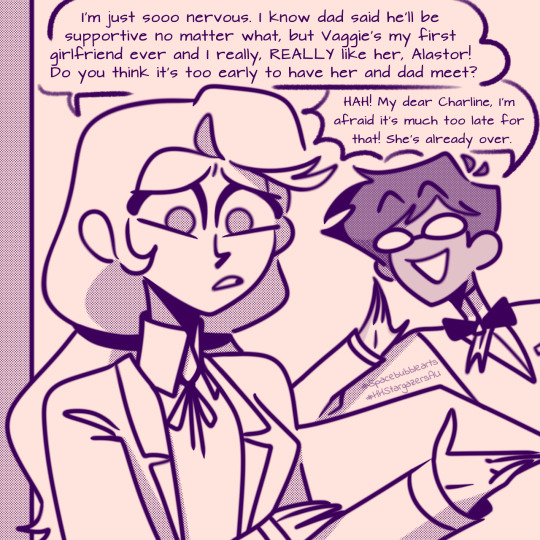

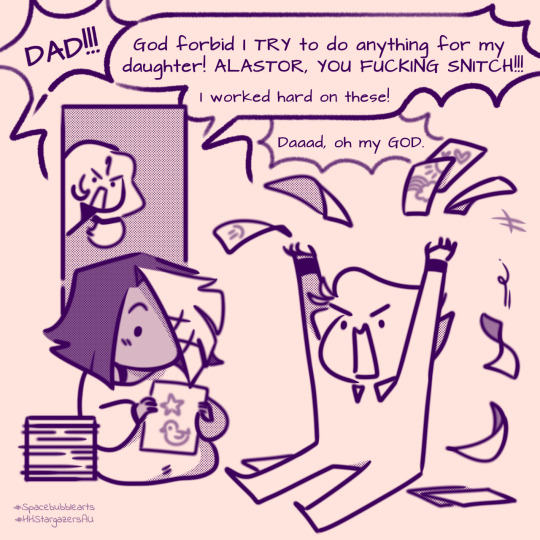
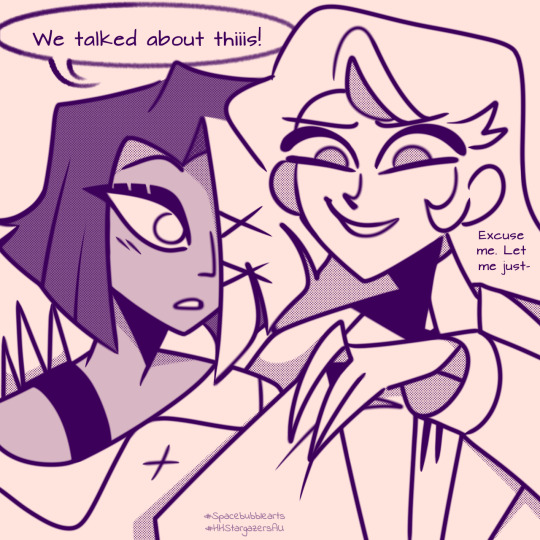



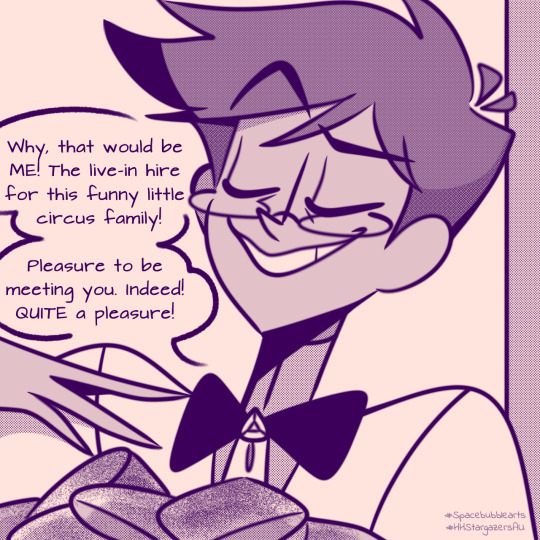
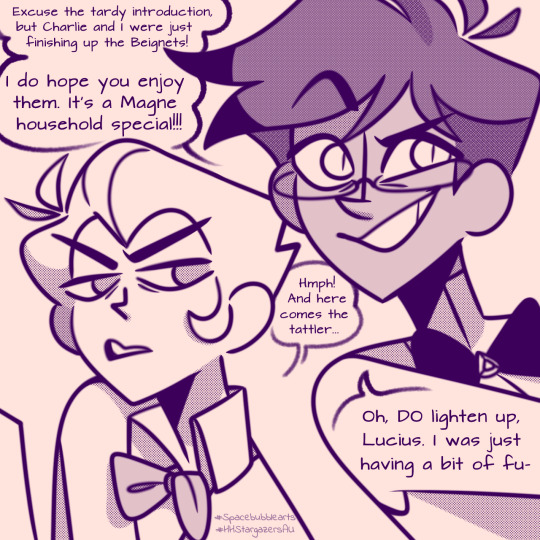

Welcome to my #HHStargazersAU! Stay Tuned~♡? -Bubbly💙
#spacebubblearts#HHStargazersAU#hazbin hotel#chaggie#radioapple#lucifer x alastor#charlie x vaggie#queerplatonic#or not as long as you enjoy this really#hazbin alastor#lucifer morningstar#charlie morningstar#hazbin vaggie#human au#angel#demons#let me COOK#world building#hopefully this was worth it#if ya'll want more do please let me know#I need the motivation haha TvT#vaggie x charlie#alastor x lucifer#appleradio#duckydeer#duckiedeer#humor#mystery#we barely scratched the surface of this AU and I am gonna BURST if I don't share it with anyone else I swear to GOD-#You think you know what's gonna happen? Excuse me while I laugh behind your back for a second NO YOU DON'T XD
3K notes
·
View notes
Text

Bonus 13: Beware the Grapes of Wrath.
[First] Prev <–-> Next
#poorly drawn mdzs#mdzs#wei wuxian#wen qing#wen ning#WWX's main weapon as the Yiling patriarch is considered to be 'Wen Ning' - which makes sense as far as the whole necromancer thing goes.#However...That *is* Wen Qing's beloved baby brother!#In her perspective WWX skipped town for a few days (or so) and took WN with him#only for them both to show up bloodied and in a state of disarray.#There's no way he told her he was going out to duel Jiang Cheng. For several reasons.#He doesn't want to involve her in his messes anymore than he already has.#It's less that she would try and stop him and more so that he honestly wouldn't even think to say something about it to her.#WQ and him aren't partners in this situation. He actually openly disregards her opinions several times.#Wei Wuxian's emotional distance from everyone around him is a big part of this arc.#Like all good tragedies...his biggest flaw is his hubris. He doesn't *need* anyone when he's so capable on his own.#He doesn't need to ask permission when obviously this is the only way forwards.#He has to do it all on his own! No one else needs to be involved!#And if you've been in the position of realizing you have a problem of toxic self-reliance - you know how harmful this mindset is.#It's why it's so satisfying to see WWX in his 'new' life start to let other's share his burdens.#I will die on the hill of 'love means carrying each other's weight. All a burden means is that I can give you support and you support me.'#YLLZ is less 'competent and sexy' and more 'depressed and can't see it'.#Another lovely nod to the main theme here is how he starts leaning more and more into the rumours about him.#Though we are also still confronted with how these rumours fail to actually live up to reality.#Rumour has it the Yiling Patriarch is undefeatable. What a shame if that rumour turned out to be untrue!
761 notes
·
View notes
Text

finally posting my handknit snoopylock sweater for sherlock holmes’s 171st birthday!
#anyway if you see a girl in a snoopylock sweater out and about come say hi!#it’s sooooo cozy guys trust me#yes the background is a dressing gown. and what about it.#if anyone wants the design i made it myself and im happy to share :)#knitting#my art#mine#sherlock holmes#acd holmes#canon holmes#snoopy#fiber arts
487 notes
·
View notes
Text

"no one can remember what happened in the previous seasons"
(except scar was totally playing dumb)
#wild life desert duo has me on a chokehold.#they started with toxic enemies situationship that shared a bed and went onto a healing era after an extremely long divorce#we love to see it!!!!!!!#lots of thoughts about this scene.#i wanted this to convey the actual tone used in the conversation more or less#but then its less obvious that scar is just straight up lying hsjdhskfhsks#we all saw you answer nearly every question correctly scar!!!! you more than anyone know what happened in third life!!!!!!#anyways. first mcyt art!!!! would have liked to give more thought to wild life grian design but i dont have enough braincells#settled for 3 useless belts for the 3 bridges#ok enough commentary.#grian#gtws#goodtimeswithscar#desert duo#wild life#3rd life#art tag#comic#life series#life smp#traffic series#traffic smp
484 notes
·
View notes
Text
wolfpack. aka: if not friend, then why friend-shaped?
"Hey-- uh, Danny?" There's an almost imperceptible tremor in Tucker's voice.
Danny doesn't look up from what he's doing, his pencil scritching across his notebook as he tries to do another quadratic formula question. "Hm."
"What's -- uh -- what's with the dogs?"
He looks up now, and finally sees where Tucker is -- standing in the doorway of his room with an ashy look on his face and a skewed, nervous smile. He's got a white knuckle grip on the doorknob. Sam is wide-eyed behind him, and using him as a partial meat-shield.
Danny looks down to the two giant ghost wolves sprawled next to him lazily. One large green one with his head in Danny's lap, letting him use him as a prop-up for his notebook. Another equally large black one splayed against his hip, sleeping on her side with her head tilted inward to his calf.
Automatically, a grin tilts across Danny's face, and he lifts his notebook up to scratch behind the green one's ears. He opens a lazy eye, one that is bloody red with a ring of yellow around the pupil, before slipping it shut and leaning his head into Danny's touch. "This is Sirius and Procyon," he says, and reaches down to scratch Sirius' belly. "And they're not dogs, they're wolves."
"Great," Tucker says, his voice suddenly much smaller and faint, "Love that distinction."
Sirius makes a great big groan, and Danny's grin widens, his heart swelling with fondness. His hand slips away from her belly, and before he can put his notebook back down, Procyon pushes his head up his lap until his ear is against his stomach, demanding pets now too.
Sam peeks her head up from over Tucker's shoulder, "I think what Tucker's asking here is what are they doing here, Danny."
He shrugs, scratching under Procyon's chin. "They kinda just showed up. I tried sending them back to the Zone, but they keep returning." And they were weirdly intent on just following him around, which is the only reason he gave up on returning them. They weren't causing trouble, and they knew how to hide around the living. Plus, he just loves dogs. "So now I have two wolves living with me."
This, oddly enough, did not do anything to calm Sam and Tucker down. Tucker's mouth purses into a thin line, and he presses the sides of his palms to his lips in prayer. "How have your parents not found out about this?"
Danny wordlessly raises his hand, and his sleeve slides down to reveal a thin chain bracelet hooked around his wrist. He whistles sharply, and both Procyon and Sirius jerk their heads up to look at him, ears pricked up and eyes alert.
Silently, he points to his wrist and rattles it twice, and in unison both wolves stand up and pounce. Instantly, they turn into a respective, opaque black and green mist that swirls around the bracelet and forms into two, flat wolf charms.
Both wolves are posing in the stereotypical wolf howl, with little stars indented on the sides. Procyon's charm has the Canis Minor constellation engraved on it, while Sirius has the Canis Major.
Danny faces Sam and Tucker, and points at his wrist. "Like this."
#danny fenton is not the ghost king#dpxdc#danny phantom#danny fenton#dp prompt#dpxdc prompt#dpxdc crossover#danny phantom au#dpxdc au#i am SO tempted to make this a danyal al ghul au for no other reason than I love Danyal Al Ghul <33 he is the most blorbo ever#wolfpack au#tagged dpxdc bc i think yall could have fun with this idea.#plus this was inspired by a clone^2 commission that i just got the finished piece for today. which i'll prolly share if anyone's interested#just no thoughts head empty danny with a mini wolfpack :] Sirius and Procyon are very protective of him. they wuuuuuv him.#my idea (kinda) is that they're actually straight up *danny's* wolves. like. they were made when he was. they're not random ghost wolves#that decided to imprint on this random ghost child. they're danny's. they're like. familiars. the fact that wolves symbolize power. loyalty#guardianship and the fact that they're described as 'extremely intuitive with a near supernatural instinct that can detect danger'#(all of which can apply to danny) was coincidental. but yeah. they formed in the ghost zone and when they didn't find their boy they went#searching for him. which is why he didn't have them right away. but also if anyone wants to take this they can interpret however they like#also like. the fact that danny canonically is friends with a wolf person (Wulf) and befriended Cujo instantly -- who is shown to be hostile#to anyone NOT danny -- makes me think that dogs just REALLY really like him. he's like. an animal whisperer. which i think is really funny#bc i think it'd drive sam -- resident animal activist -- up a wall. just a little bit. like yes its great that these animals love danny sm!#but also!!! she!! look her way pls. she loves you animals sm. she's vegetarian!! she's just a little envious. just a tad.#just mmm the mental image of Sirius and Procyon stalking out of Danny's shadow with deep rumbling growls. their hackles raised and their#muzzles scrunched up to reveal dangerously sharp gleaming teeth. they're protecting their boy.
523 notes
·
View notes
Text



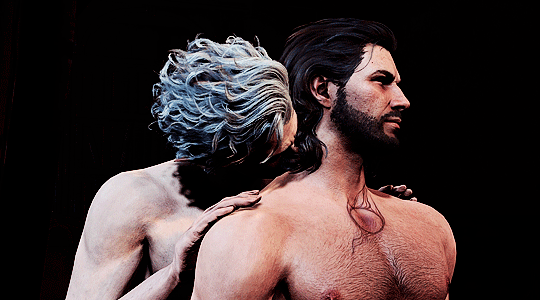
You have given me everything.
#baldur's gate 3#bg3#bg3edit#bloodweave#astarion x gale#*mine: gifs#nsft#just in case#some of the limbs are awkward#but idc#a gift for everyone sharing amazing fic and art#i have so many gifs#but don't want to annoy anyone#this is also the first time i've seen ascended astarion#and it made me so sad#*mine: bw gifs#gale dekarios#astarion ancunin
3K notes
·
View notes
Text
sometimes spite is a powerful motivator and today its motivating me to crochet
long story short I saw a cool bag on pinterest while I was looking for crochet patterns but there was no fucking pattern but one of my friends found a pattern for a similar but not quite bag so I watched an hour long video, transcribed it into text, and am now gonna make a wholeass backpack just because Sunflower Vibe
Wish me luck I guess
Also this is the bag

#anis crochet journey#ani rambles#out of queue#do i have enough green yarn for this? no idea#if i need more I'll go buy more it'll be a nice excuse to get myself a cute planner for garden planning anyways#'ani dont you carry a purse around everywhere what would you carry in this extra bag' idk yet but its CUTE I will FIND A REASON#also if anyone asks yes I'm willing to share the transcription if someone wants it#like literally if someone reblogs or replies to this post 'plz transcription' i will post a link to the google doc in an INSTANT#i spent like 2 hours on that transcription I want it to be APPRECIATED (by more than just me)
2K notes
·
View notes
Text
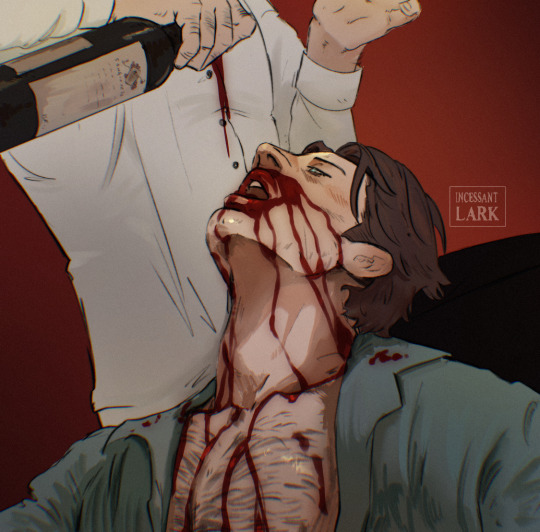
that one photo but hoffstrahm
#little intermission while i work on a silly hoffstrahm mini comic#not sure if ill end up finishing it or not yet#so far i've got 1 page drafted and a few more pages currently being brainstormed on#i want to do a collectkin comic page or two at some point too but i haven't come up with any ideas just yet#have to shuffle my playlists again for more inspo#if anyone has any suggestions feel free to share them with me#i love yapping ab my fixations#hoffstrahm#coffinshipping#saw franchise#peter strahm#mark hoffman#sawposting#saw#saw iv#saw v#my art
391 notes
·
View notes
Text
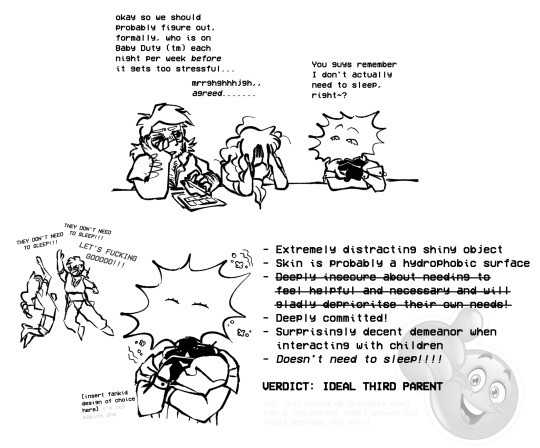
heres your highly requested fluff you fucking animals
#this is all youre getting now SCRAM. we're back to the socratic dialogues after this#anyway this whole game was about how family can be a hodge-podge of whatever you want idk why people keep nuclear-family-itising isafrin#im not accusing anyone of anything i just think its odd that we're not just immediately making that family unit 8 people big minimum#with zero deliniation between the roles shared between 'birth parents' and the other ones. just seems odd to draw those lines#mirabelle isabeau and loop fight for the title of mother: GO#anyway claps my hands together these are the extents of my thoughts here i dont do fankids thats too far into the future for me.#way too many variables. cant extrapolate shit. aint my wheelhouse. this is just here for the joke that loop is a walking baby sensory video#isiloop#sloopis#isat#isat spoilers#isat loop#isat siffrin#isat isabeau#doodlebyte#i think so confidently calling loop a sensitive insecure fucker gets to merit the spoilers tag. and also idk man it just feels it in nature
610 notes
·
View notes
Text

sorry these kinds of comments have been really pissing me off recently lol
#it's been kinda hard for me to pinpoint WHY exactly these sort of comments feel insulting#but i think it's mostly because it implies my original work is purposefully and inherently derivative of things i have no connection to#while i think being derivative in art is. kinda unavoidable in a sense (and something i'm aware i do consciously and unconsciously)#it feels like a slap in the face when people imply that my work cannot hold its own merit and need to be compared to#something in the popular conscious#and like sometimes people don't know it's original art which is fine#but it also doesn't hurt to ask if it's original instead of just. immediately assuming or comparing it to something else#i know this will only get more difficult as i continue to drift away from fanart and fan works#but i really want to be able to be proud of my original work and i want to share more! because it's a part of me!!#but its really hard when it feels like i'm always going to be compared to things people care about more!!!! AAAUGH#god. ok sorry i need to get that off my chest. if anyone compares computer angel to TMA again im gonna start eating drywall#fern's sketchbook
890 notes
·
View notes
Text








"I have many fears, most of them about Lucrezia." — Cesare Borgia (The Borgias, 2011-2013) + hints of insecurity
that she adores someone that much / if she will reject his dark nature and act of love and violence as Ursula did / if he truly is not part of her desires / that she easily forgets him
#i have so many thoughts on these two#hes such a clingy brother wth#as much as he soothes her it is only by asking lucrezia verbally or#by looking at her that his fears and insecurities in her life can be soothed#cesare torn between - being relieved she had some joy in the ruthless marriage he had no power to prevent and did not even want to bless#or being envious there is someone else now when his little sister once said she will not love anyone as much as she loves him#but Accepting it anyways because it is impossible loves and maybe he is starting to become aware his love falls in this same category.#“should i envy this narcissus low-born who shall never see you again because of his impossible love for you when i love you just the same?”#the knife more surprise than fear. in a time when he did not love himself...“she accepts me as i am? as i do her”#biting her as if another black panther pet looking for reassurance that their love#that HE is still included in her perfect world even if he himself pulls away#“surely you're in agony as much as i am? are you already satisfied with your child and husband if we cannot share our love openly?”#“your eyes drift to mine when you say 'husband' am i not he? do you see me as so even when it was just 'tonight'?”#and then his sudden gaze as if to look for truth because how can she forget him when he only thinks of her#AND AGAIN pulling away being eaten by shame and guilt of corrupting her (when their relationship is not just his doing)#torn between hope (we have the capacity to forget and move on) and hope (our love has that much devil power over her)#cesare as the god or the devil or whatever it is that overwhelms whether at war or in love#cesare is one confident man and even if his insecurities has layers of righteousness and importance..it is still insecurity nonetheless#and only for lucrezia#lucrezia borgia#cesare borgia#cesare x lucrezia#the borgias#dailyborgia#perioddramaedit#perioddramasource#weloveperioddrama#onlyperioddramas#romancegifs#the borgiasedit
550 notes
·
View notes
Text




me when i make an au centering around eclipse and shadow but instead i focus on the two gay hedgehogs even tho one of them barely makes an appearance in said au
#art stuff#sonic the hedgehog#shadow the hedgehog#sonadow#ig!#qpr sonadow#if anythin tbh#me: im not going to post on tumblr im not really 'back' yet#also me: I NEED TO SHOW PEOPL ETHE HEDGEHOGS#im still learning how to draw them#i also need more brushes so if anyone has any procreate brushes they want to share im all ears#esp calligraphy pens i've started to LOVE them recently#sonic au idk what to call it- cheese and fries au#yeah sure
241 notes
·
View notes
Text
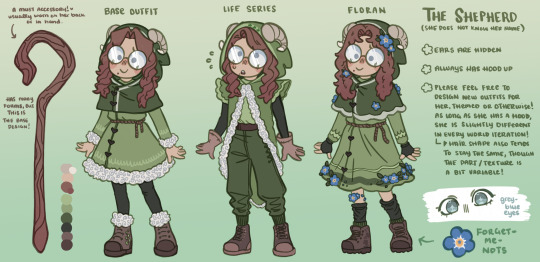
Prepping for Art Fight for the first time, so I’m finally making some solid refs for my sona!! :] Figured I would share her here!
#the shepherd#my sona#trafficsona#mc sona#minecraft oc#my ocs#art escapades#original character#reference sheet#it’s got some instructions about outfits and stuff but that’s really only for anyone who wants to attack with her hehehe#I love her dearly she is so dumb <3#well#ditzy#nothing going on in that head#except occasional violence#every iteration of her in a news world is sliiiightly different!#but on her home world (her equivalent of hermitcraft) she’s in the base skin :D#I recently gave her big ol bug eyes on the ol’ minecraft skin so maybe I’ll share that at some point too hehe#she also carries a big crook. hm#brb let me add that
484 notes
·
View notes